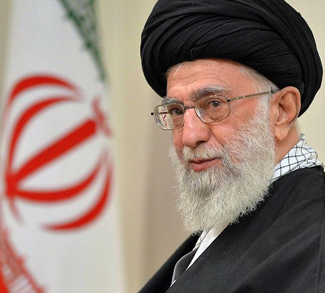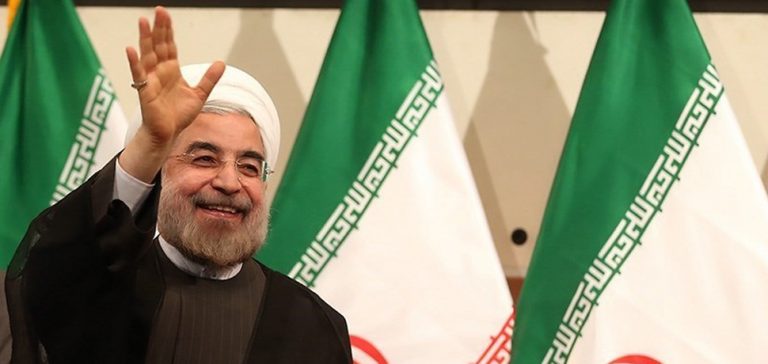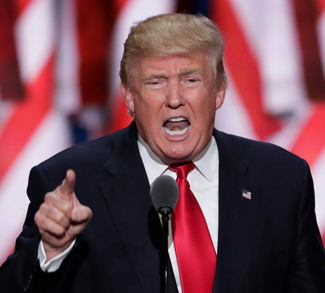During the last few days, one of the most debated issues has been President Donald Trump’s decision to withdraw support from the Iran nuclear deal, officially known as Joint Comprehensive Plan Of Action, or JCPOA. But while certainly being important, President Trump’s decision is not on its own able to sink the agreement, as Congress would have to follow up by voting in favor for restoring sanctions on Iran. What is far more relevant however is the new overall policy direction, and the discourse that Trump and his administration will adopt on Iran and on foreign affairs in general moving forward. This is what will ultimately determine the deal’s political sustainability over the long term. And to properly understand why, it is necessary to consider an important but neglected dimension of foreign policy: rhetoric.
Trump’s rhetoric on Iran: words matter
An important aspect of Trump’s approach on Iran (as well as on North Korea and many other issues) is the aggressive discourse he adopts. In fact, during his speech at the UN General Assembly last month, the president included the Islamic Republic among a “small group of rogue regimes,” calling it a “corrupt dictatorship” and accusing it of “bringing death and destruction.” Later, Trump declared: “the Iranian regime supports terrorism and exports violence and chaos across the Middle East.” Again, when he announced that he will not certify the JCPOA once more, he defined Iran as a “fanatical regime” and branded it the “number one” threat in the Middle East, replacing Islamic State.
Certainly Tehran is not innocent. It is an active player in the region, one which supports the Assad regime in Syria, groups like Hezbollah in Lebanon, as well as various Shia armed factions in Iraq. It is engaged in a fierce competition for regional primacy with Saudi Arabia and is traditionally hostile to Israel, both of which are allies of the U.S. In August, Iran’s parliament approved a bill allocating around 500 million USD to military expenditures (including the missile program) in an attempt to counter the “terrorist and adventurist activities” of the U.S., with MPs cheering and shouting “death to America.” In response to Trump’s speech at the UN, Iranian President Hassan Rouhani defined him a “rogue newcomer to international politics” and condemned his “ignorant, absurd, and hateful rhetoric.” This last declaration is important, as it indicates that words matter; not only because they signal mutual enmity, but most importantly because they deliver a hostile message that builds and reinforces the perception of threat.
Now this point is central. Decision-makers should always examine the opponent’s point of view when formulating a policy – something that Trump is not doing with Iran. As a matter of fact, one should consider why Tehran was pursuing a nuclear program in the first place.
It is notable that President Trump is adopting the same kind of rhetoric that Bush used, almost to the point of repeating the same words.
Iran’s nuclear program has a long history, but its current phase dates back to the early 2000s. Initially it was conducted in secrecy, so when it was discovered in August 2002 the revelation raised suspicions that the program had a military dimension. However, Teheran remained in the Non-Proliferation Treaty (NPT) because it insisted that its nuclear program had exclusively civilian purposes and was therefore respectful of the non-proliferation regime. To understand the reasons behind Iran’s move, it is necessary to recall the international situation at the time. The Bush administration was in charge in Washington. In the wake of the shock provoked by the 9/11 terrorist attacks, it was advocating for and actively pursuing a “global war on terror,” and vehemently accused those “rogue states” believed to be sponsoring terrorism and proliferating weapons of mass destruction (WMDs). Among such countries, there were Iraq, North Korea, and Iran, forming what Bush called the “Axis of Evil” in his State of the Union address in January 2002. The U.S. had occupied Afghanistan in 2001, and invaded Iraq in 2003. In this context, the other states in the “axis” felt threatened by the administration’s preventive war doctrine, and decided to act in order to ensure its own survival in case of a potential US preemptive attack. North Korea abandoned the NPT and resumed its nuclear weapons program. Iran’s decision to renew its efforts on the nuclear front followed the same logic.
From Iran’s (and North Korea’s) point of view, such actions are perfectly rational. Against the eventuality of a US-led invasion, the best option in the eyes of Tehran was to seek nuclear weapons as the ultimate form of deterrence. Interestingly, the Iranians made their decision in the wake of Bush’s bellicose rhetoric, as it made them feel more threatened. One should also remember that preserving the country from foreign (and particularly American) influences is a top priority of the Iranian regime, and the very constitution of the country contains specific dispositions in this sense; in particular, those indicated in article 152. This is due to the fact that present-day Iran was born out of the dramatic events of the 1979 Islamic Revolution which overthrew the pro-US Shah. Therefore, the regime’s legitimacy largely rests on its ability to keep the U.S. out of the country. According to this logic, adopting Tehran’s viewpoint, it is clear that nuclear weapons represented the best guarantee against a possible American attack, an eventuality that seemed realistic when Iran’s secret nuclear program was first discovered in August 2002. Afghanistan had been occupied the previous year, the invasion of Iraq seemed more likely with every passing day (and in fact it would start in 2003), and tensions with North Korea were mounting as well. These US military interventions made Iran feel surrounded after 2003, thus increasing its sense of insecurity and reinforcing the conviction that nuclear weapons were needed to protect itself.
It is notable that President Trump is adopting the same kind of rhetoric that Bush used back then, almost to the point of repeating the same words. Both defined Iran (as well as North Korea) as a “rogue state” and openly accused it of being a dangerous and destabilizing dictatorship which supports terrorism and acts against the U.S. and its allies. While such claims are to a considerable extent true, this kind of discourse is risky. As a matter of fact, in the eyes of the Iran regime, it reinforces the perception of being threatened, which in turn is exactly the reason that drove it to obtain nuclear weapons in the first place. And even assuming that Tehran is acting out of expansionist ambitions and not in self-defense, this discourse would give it a perfect excuse to abandon its commitment to the deal. In both cases, a similar rhetoric can realistically result in Iran restarting its nuclear program. Naturally, this would mean the failure of the JCPOA and a new crisis on the Iranian nuclear issue, whose outcome would be unpredictable.
Far more than a simple decision on whether or not to certify the deal, it is the discourse itself that risks undermining the Iran nuclear deal over the long term.
Iran’s ballistic missile tests: facts matter as well
Of course, the Iranians have their own responsibilities as well. Even though they have been careful not to violate the letter of the agreement (its specific material clauses), they have nevertheless acted in a volatile way. A considerable problem is the ballistic missile tests conducted in January and September, which prompted Washington to impose new targeted sanctions. Even though Teheran considers them a “deterrent” (as declared by Rouhani himself) these tests appear to the Trump administration as a violation not only of a UN resolution demanding Iran not develop ballistic missiles capable of delivering nuclear warheads, but also of the spirit of JCPOA. As a matter of fact, from a strategic point of view such missiles are a meaningful deterrent only if they carry a nuclear warhead or another kind of WMD; therefore, it appears suspicious that Iran still tests them if it has in fact renounced its nuclear program. Tehran responds by pointing out that the missiles are not designed to carry nuclear weapons. This is clearly not enough to remove the air of suspicion, especially when Rouhani himself implicitly declared in August that Iran is ready to resume its nuclear program in case the US imposes other sanctions, and that (thanks to the resources it obtained after the lifting of sanctions) if it does it will be even stronger than before.
But again, the tests and statements from the Rouhani regime reveal that Teheran considers the nuclear program as a response to Washington’s hawkish foreign policy. In other words, it’s a way of protecting the regime from foreign aggression through deterrence. Accordingly, any kind of threatening discourse will produce counterproductive results, as it will only reinforce the sense of threat perceived by the Iranian regime, thus pushing it to resume its nuclear program and abandon the deal even though it is also in Iran’s interests to maintain it.
It’s in this way that the JCPOA’s long-term tenure is strongly influenced by Trump’s rhetoric.
Words are not everything: why the JCPOA may still hold, and how it may collapse
Beyond the risks associated with Trump’s aggressive rhetoric, the situation today is not exactly the same as it was during Bush’s first term. During Obama’s eight years in the White House, the U.S. avoided any new direct military adventure, preferring the “lead from behind” approach and limiting the use of the armed force. And by now the Trump administration, contrary to what President Bush did, has not transformed its discourse against “rogue states” into actual military interventions. As such, the threat perception in Tehran may not reach the critical level that would prompt it to resume its nuclear program.
Moreover, one should also recall that the other powers who negotiated the JCPOA are favorable to keeping it in place, and that following Trump’s announcement about his willingness not to certify the deal for the third time, all other parties expressed their continued support for the agreement. As such, even if the U.S. were to abandon the deal, it may still survive. This would leave Washington isolated, as well as hamper the effect of any new sanctions it may impose on Tehran. If the other parties don’t follow suit, then the U.S. unilateral measures alone are unlikely to have sufficient strength to force Iran back to the negotiating table.
It’s possible that, despite Trump’s rhetoric, Iran will not consider the threat serious enough to resume its nuclear program and invite the economic and political costs of such a move. As a result, the JCPOA may endure, either because the Congress will not restore sanctions or because the rest of the P5+1 group will continue supporting it. Still, if the U.S. abandons the deal, tensions would nevertheless rise in the Middle East, adding further instability in the region with potential deleterious effects. However, there is a factor that may provoke a radical change in Iran’s threat perception and push it to seek a nuclear deterrent once again: a US military intervention in the near future. In that case, as in 2002, the combination of a harsh rhetoric and an aggressive foreign policy will lead Iran to consider the threat of an American attack credible enough to justify the need to acquire nuclear weapons, thus resuming the previous stand-off. In short, if the U.S. refrains from starting any new unilateral military adventures, the deal may last, but if America resumes a policy akin to that of former President Bush, then Iran will respond by seeking nuclear weapons as a deterrence against US military action.
Predicting the future is impossible. But we’ve seen this all before, and we should already know what happens.
The opinions, beliefs, and viewpoints expressed by the authors are theirs alone and don’t reflect any official position of Geopoliticalmonitor.com.




